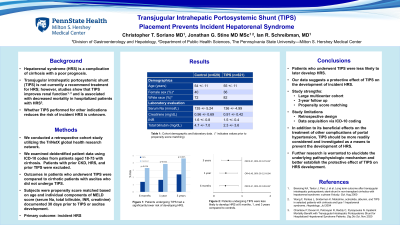Back


Poster Session A - Sunday Afternoon
Category: Liver
A0479 - Transjugular Intrahepatic Portosystemic Shunt (TIPS) Placement Prevents Incident Hepatorenal Syndrome
Sunday, October 23, 2022
5:00 PM – 7:00 PM ET
Location: Crown Ballroom

Has Audio
.jpg)
Christopher Soriano, MD
Penn State Milton S. Hershey Medical Center
Hershey, PA
Presenting Author(s)
Christopher Soriano, MD1, Jonathan G. Stine, MD, MSC2, Ian R. Schreibman, MD1
1Penn State Milton S. Hershey Medical Center, Hershey, PA; 2Penn State Liver Center, Hershey, PA
Introduction: Hepatorenal syndrome (HRS) is a feared complication in patients with cirrhosis with high morbidity and mortality rates, longer length of hospital stay, and greater healthcare costs. There is a clear unmet need to prevent HRS in order to improve patient-oriented outcomes. While transjugular intrahepatic portosystemic shunt (TIPS) has been shown to have a mortality benefit in patients with HRS and is used as a treatment for this condition, whether TIPS performed for other indications reduces the risk of incident HRS remains unknown.
Methods: We performed a retrospective cohort study utilizing the Trinetx global health research network. We examined deidentified data on patients with cirrhosis aged 18-75 using ICD-10 codes. Patients who underwent a liver transplant or with a history of chronic kidney disease were excluded. Patients who underwent TIPS were compared to non-TIPS patients with ascites . Experimental (TIPS) and control groups (non-TIPS) were propensity score matched based on individual components of the MELD-Na score documented 30-days prior to TIPS (experimental group) or ascites development (non-TIPS). The primary outcome was incident HRS.
Results: 1,250 propensity score matched patients were included in analysis. Mean age (55 +/-11 years vs. 54+/-11 years), serum sodium (136+/-5.0 vs. 135+/-5.2), creatinine (0.91+/-0.42 vs. 0.96+/-0.69), total bilirubin (2.3+/-3.6 vs. 4.7+/-7.0), and INR (1.5+/-0.4 vs. 1.6+/-0.8) was similar in both groups. 621 underwent TIPS. Development of HRS in the TIPS group was approximately twice less likely than in the non-TIPS group (OR = 0.512, 95% CI 0.272-0.965; p = 0.0352).
Discussion: Our results indicate that TIPS has a protective effect on the development of HRS in cirrhotic patients. Given the overall poor prognosis and high healthcare costs in these patients, our findings suggest that TIPS should be more readily considered in cirrhotic patients even prior to the development of HRS as a means to reduce the risk of its development. Further research is warranted to better establish the protective effect of TIPS on HRS and to guide clinical decision-making.
Disclosures:
Christopher Soriano, MD1, Jonathan G. Stine, MD, MSC2, Ian R. Schreibman, MD1. A0479 - Transjugular Intrahepatic Portosystemic Shunt (TIPS) Placement Prevents Incident Hepatorenal Syndrome, ACG 2022 Annual Scientific Meeting Abstracts. Charlotte, NC: American College of Gastroenterology.
1Penn State Milton S. Hershey Medical Center, Hershey, PA; 2Penn State Liver Center, Hershey, PA
Introduction: Hepatorenal syndrome (HRS) is a feared complication in patients with cirrhosis with high morbidity and mortality rates, longer length of hospital stay, and greater healthcare costs. There is a clear unmet need to prevent HRS in order to improve patient-oriented outcomes. While transjugular intrahepatic portosystemic shunt (TIPS) has been shown to have a mortality benefit in patients with HRS and is used as a treatment for this condition, whether TIPS performed for other indications reduces the risk of incident HRS remains unknown.
Methods: We performed a retrospective cohort study utilizing the Trinetx global health research network. We examined deidentified data on patients with cirrhosis aged 18-75 using ICD-10 codes. Patients who underwent a liver transplant or with a history of chronic kidney disease were excluded. Patients who underwent TIPS were compared to non-TIPS patients with ascites . Experimental (TIPS) and control groups (non-TIPS) were propensity score matched based on individual components of the MELD-Na score documented 30-days prior to TIPS (experimental group) or ascites development (non-TIPS). The primary outcome was incident HRS.
Results: 1,250 propensity score matched patients were included in analysis. Mean age (55 +/-11 years vs. 54+/-11 years), serum sodium (136+/-5.0 vs. 135+/-5.2), creatinine (0.91+/-0.42 vs. 0.96+/-0.69), total bilirubin (2.3+/-3.6 vs. 4.7+/-7.0), and INR (1.5+/-0.4 vs. 1.6+/-0.8) was similar in both groups. 621 underwent TIPS. Development of HRS in the TIPS group was approximately twice less likely than in the non-TIPS group (OR = 0.512, 95% CI 0.272-0.965; p = 0.0352).
Discussion: Our results indicate that TIPS has a protective effect on the development of HRS in cirrhotic patients. Given the overall poor prognosis and high healthcare costs in these patients, our findings suggest that TIPS should be more readily considered in cirrhotic patients even prior to the development of HRS as a means to reduce the risk of its development. Further research is warranted to better establish the protective effect of TIPS on HRS and to guide clinical decision-making.
Disclosures:
Christopher Soriano indicated no relevant financial relationships.
Jonathan Stine: Astra Zeneca – Grant/Research Support. Galectin – Grant/Research Support. Grifols – Grant/Research Support. Noom – Grant/Research Support. Novo Nordisk – Grant/Research Support.
Ian Schreibman indicated no relevant financial relationships.
Christopher Soriano, MD1, Jonathan G. Stine, MD, MSC2, Ian R. Schreibman, MD1. A0479 - Transjugular Intrahepatic Portosystemic Shunt (TIPS) Placement Prevents Incident Hepatorenal Syndrome, ACG 2022 Annual Scientific Meeting Abstracts. Charlotte, NC: American College of Gastroenterology.

